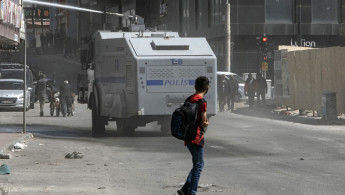Did deliberate disinformation lead to Turkey's anti-Syrian refugee riots?
Allegations of the sexual abuse of a child by a Syrian man in the central Turkish city of Kayseri sparked a wave of xenophobic riots this week, targeting Syrian businesses and cars.
The three-days riots marked the worst anti-Syrian violence in Turkey since a wave of xenophobic rhetoric about refugees in the Turkish political scene emerged, particularly among parties opposed to President Recep Tayyip Erdogan's governing Justice and Development Party (AKP).
In a televised address on Monday, Erdogan accused opposition parties, which had advocated for the expulsion of refugees, of inciting violence.
"Nothing can be achieved by fueling xenophobia and hatred of refugees in society," Erdogan said and accused the opposition of "poisonous discourse".
Also on Monday, Fahrettin Altun, the Turkish government's communications director, said that the riots were being fuelled by "anti-Turkey elements", blaming them for spreading "provocative activities aimed at testing public order".
What happened in Kayseri?
Late on Sunday, word began to spread on social media that a Syrian man had "sexually assaulted" a young Turkish girl in Kayseri, with some saying she was as young as five-years-old.
The Turkish government later confirmed that a Syrian man had been arrested in the Melikgazi region of the Kayseri province over allegations of sexually harassing a seven-year-old Syrian girl.
The girl, along with her siblings and mother, have been placed in protective state custody.
Xenophobia, incitement and violence
Reports of the alleged abuse quickly spread across social media, with skewed narratives and outright lies about the incident which led to riots among Turks in the central Anatolian city who torched cars and Syrian-run businesses.
Before the truth of the situation could be established, anti-Syrian voices and political parties began to shape the narrative and skew it towards xenophobic incitement.
Even after it emerged that the girl was Syrian, some figures continued to use the incident to incite violence against Syrians in Turkey. False images of Syrians burning Turkish flags were shared online.
Umit Ozdag, the leader of Turkey’s anti-migration Victory Party, immediately blamed the Melikgazi tensions on the government's allegedly "privileged" treatment of Syrian refugees.
"In summary, it's the government's wrongful Syria policy that is to blame," Ozdag said. "Don’t go looking elsewhere."
The rioting also spread beyond Kayseri, with the Turkish fascist Grey Wolves mobilising in Hatay, near the Syrian border, attacking local Syrian shops and surrounding the region’s municipal building chanting: "We don’t want refugees."
In Adana, Turkish police scrambled to stop racist Turkish motorcycle gangs entering Syrian neighbourhoods, with the group chanting racist slogans such as "We don’t want Syrians".
So far, 474 people have been detained by Turkish police for participation in the riots.
Turkey hosts more Syrian refugees than any other country, but the government has often struggled to integrate Syrian refugees fully into society and the economy. This, combined with a struggling economy, has turned Syrians into political scapegoats with racist incidents against Syrians skyrocketing in recent years.
Anti-Syrian bots
In addition to political forces stoking xenophobia, Turkish Interior Minister Ali Yerlikaya said 343,000 anti-Syrian posts were made from approximately 79,000 accounts on X following the events.
Of this, Yerlikaya said security agencies had determined that 37 percent of these were from bots with 68 percent of the fake accounts making "provocative" comments about Syrians.
The Turkish government has not said where the bots originate from, but they confirmed they were investigating 10 of them to see if they are linked to a wider move to sow chaos in Turkey.
The Syrian response
Following the rampage against Syrians in Turkey, four people were killed after armed Syrian protesters and Turkish forces clashed in Syria's northwest on Monday, the Syrian Observatory for Human Rights (SOHR) said.
"Four people were killed in exchanges of fire between protesters and guards stationed at Turkish positions," the SOHR said.
The Syrian National Army, a coalition of armed Syrian opposition groups backed by Turkey, urged residents of northwestern Syria to "avoid being drawn in by seditionists who seek to sabotage our institutions".
It comes after apparent rapprochement between Ankara and the Syrian regime, including plans to open a crossing between government-held areas and those controlled by Turkish-backed opposition forces in Aleppo province.
Agencies contributed to this report.




 Follow the Middle East's top stories in English at The New Arab on Google News
Follow the Middle East's top stories in English at The New Arab on Google News


